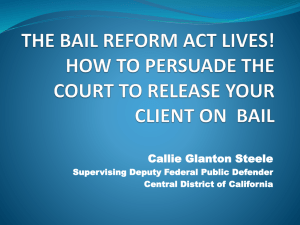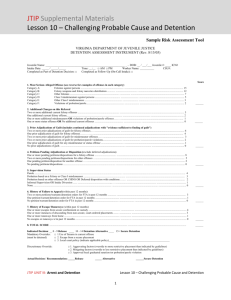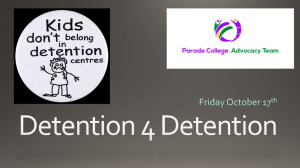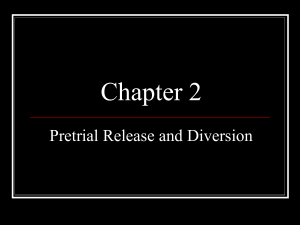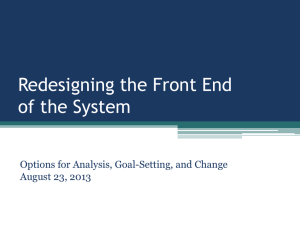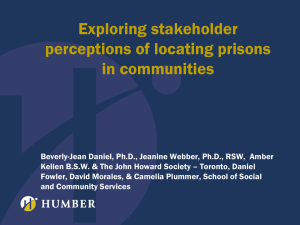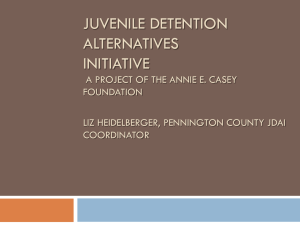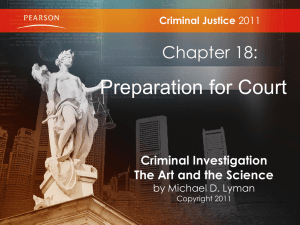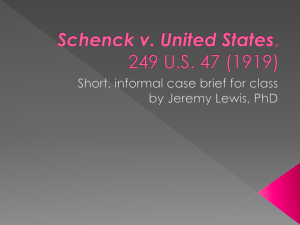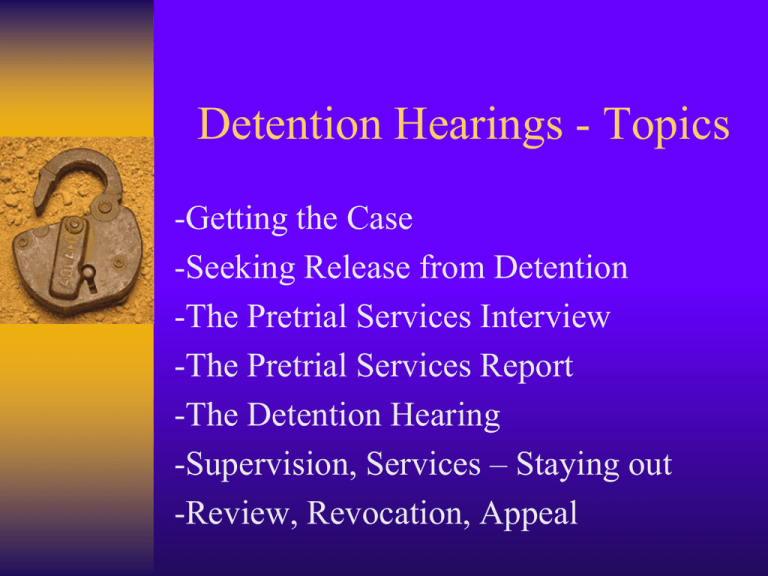
Detention Hearings - Topics
-Getting the Case
-Seeking Release from Detention
-The Pretrial Services Interview
-The Pretrial Services Report
-The Detention Hearing
-Supervision, Services – Staying out
-Review, Revocation, Appeal
Getting the Case
• Call the AUSA and Pretrial Services
• Detainer?
• Criminal History?
• Detention? 3 Days?
• See the Client
Why Bother Seeking Release?
Rewards:
-client preference
-discovery review
-sentencing set-up
-treatment, job
-BOP designation
-client relationship
Risks
-Delay?: need more info
-about case
-about release plan
-Interview pitfalls
-obstruction
-18 USC 1001
-Sentencing – pitfalls
Pretrial Services Interview
Social History
• Education
• Residential
• Employment
• Family
• Drug/Alcohol History
• Mental Health History
• Assets/Income
• Contacts
Preparing for the Interview
•
•
•
•
•
Review topics with client
Think expansively about the “the crime”
Be there!!
Tricky areas: drugs, mental health, finances
Timing – slow it down or fast
• Does case need some release planning?
• Advise client:
• Pretrial will confirm info he provides; call the family
yourself
• Lies may cost you – detention, sentencing, crime
• Don’t have to answer every question.
The Pretrial Services Report
• Criminal History
• Warrants, holds, FTA’s
• Social History
• Third party – corroboration
• Recommendation
The Hearing / Law
The Bail Reform Act
18 U.S.C. 3142
Hearing
• Defendant may testify, present information,
present witnesses, cross-examine.
• Typically, information is presented by
proffer. Rules of evidence do not apply.
• Victims can be heard, re: danger.
• Some discovery may be had depending on
how government proceeds.
Options for the Court
1. Release on PR or Unsecured Appearance
Bond – default position
2. Release with Conditions – only if judge finds
flight risk or danger to the community.
3. Temporary Detention (on bail, alien)
4. Detention – no conditions could reasonably
assure appearance or protect community.
Government Motion for Detention Three Day Continuance
•
•
•
•
•
Crime of Violence, with max 10 yrs or more,
Terrorism Cases,
Any offense with max of life prison or death,
Drug Offense with max 10 years or more,
Minor victim, firearm offenses, Failure to
Register,
• Serious Risk of Flight or Danger,
• Any felony if defendant has 2 or more prior
convictions for any of the above offenses.
Detention Hearing – Burden on
Government
• Serious Risk of flight or danger
• No condition or combination of
conditions will:
1. Reasonably assure future appearance
(preponderance of evidence)
OR
2. Adequately protect community
(clear/convincing evidence).
Factors to Consider
• Nature/circumstance of offense
• Violent offense or drug offense
•
•
•
•
•
Weight of Evidence (least important)
History/Characteristics of Defendant
Physical/Mental Condition
Family Ties
Employment
Factors (cont…)
•
•
•
•
•
•
•
Financial Resources
Length of Residence in Community
Community Ties
Past Conduct
History of Drug/Alcohol Abuse
Criminal History (generally) / FTA record
Release status – supervision, bail, etc…
Conditions/Resources Available
•
•
•
•
•
•
GPS Monitoring (various levels)
Treatment – CD and MH
Computer Monitoring
Financial Monitoring
Financial Bond/Lien
Third Party Custodian
Presumption Cases
(based on current offense)
• Rebuttable presumption that person will be
detained, if probable cause to believe
•
•
•
•
•
committed drug offense, max 10+ yrs or more,
924(c) offense,
Conspiracy to kill in foreign country, terrorism,
Trafficking (sex, peonage, slavery), or
Crime involving minor victim.
Rebuttable Presumption Cases
(Based on prior convictions)
1. Prior convictions for certain enumerated types of
offenses (e.g. “3 days offenses” - violent crime, drug
offense, offense against minors, FTR etc…), AND
2. That prior offense was committed while the
person was on release pending trial for a Federal,
State, or local offense; AND
3. A period of not more than five years has elapsed
since the date of conviction, or the release of the
person from imprisonment, for that prior offense.
Presumption Cases Aren’t So Bad
• Burden of production only
• Can be met via Pretrial Services Report
• Some credible evidence showing defendant
is not a flight risk or danger to community,
• “small burden”
• Examples -
Generally
• Detention is the exception, and should be
ordered ONLY in rare cases.
• Doubts regarding the propriety of release
should be resolved in defendant's favor.
• Court must find that NO CONDITIONS
could adequately protect the community or
reasonably assure appearance.
Review
• Either side may seek review before district
court.
• Magistrate may reconsider – new evidence.
• Review must be prompt.
• De novo review by district court.
• Parties may submit additional evidence.
Release on Supervision
• Work with Client / Pretrial Officer
• Additional resources needed?
• Advice from Pretrial?
Revocation
• Violations – revocation/detention.
• Failure to Appear or self-surrender is a
crime, resulting in consecutive sentence.
• Committing a crime while on supervision
is also a separate federal crime, resulting in
consecutive sentence.
Post-Conviction
(plea/trial)
• Strong presumption after conviction unless:
• guideline recommends probation.
• Clear/convincing evidence that defendant is not
a flight risk or danger.
• If an (f)(1) offense, detention required unless
clear/convincing evidence defendant is not a
danger/flight risk, AND likelihood of Rule
29/New Trial motion or Government will
recommend no prison.
• If remain released – self-surrender.
Pending Appeal
• Detention if it’s an (f)(1) offense;
• Other offenses, detention unless:
• Clear/convincing evidence not a flight
risk/danger, AND
• Appeal will likely win, or a non-prison
sentence is likely (or credit for time served
sentence).
Sentencing
• Release Status Report by Pretrial Services

